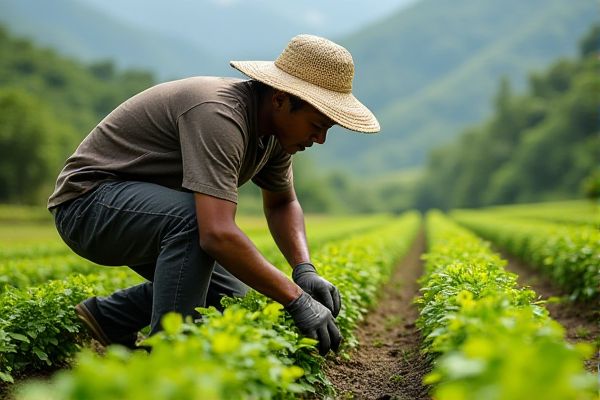
The Philippines offers a variety of farm job opportunities across different agricultural sectors, including rice, coconut, and sugarcane production. Roles range from field workers, responsible for planting and harvesting, to specialized positions such as agronomists and farm managers. Many jobs provide significant on-the-job training, helping individuals develop skills in crop management, livestock care, and sustainable farming practices. The demand for agricultural workers often peaks during planting and harvest seasons, creating seasonal opportunities for increased employment.
Job Description
Farm work jobs in the Philippines involve a variety of tasks essential for agricultural production. Responsibilities may include planting, harvesting, and maintaining crops, ensuring quality and sustainability throughout the farming process. This type of employment often requires physical stamina and an appreciation for outdoor work, as you will be exposed to varying weather conditions. Opportunities in this sector can lead to valuable skills in horticulture and agricultural practices, contributing to local food security and economic growth.
Requirement
Farm work jobs in the Philippines often require a strong physical stamina and a willingness to work long hours in various weather conditions. Depending on the specific role, employers may look for experience in agriculture or related fields, although some positions provide on-the-job training. Basic knowledge of crop cultivation, livestock management, and the use of farming equipment can be beneficial. Familiarity with local agricultural practices and regulations is also an asset for those seeking employment in this sector.
Salary and Perks Expected
Farm work jobs in the Philippines typically offer a salary that ranges from PHP 250 to PHP 600 per day, depending on the type of work and location. Many positions also come with added benefits such as housing, food allowances, and medical assistance, which can significantly enhance overall compensation. Rural areas may provide more opportunities for agricultural roles, particularly during planting and harvest seasons. Engaging in farm work not only supports local communities but also allows you to connect with the rich agricultural heritage of the Philippines.
Similar Job Names
- Farm Manager
- Agricultural Technician
- Crop Scientist
- Livestock Handler
- Farm Laborer
- Horticulturist
- Soil Scientist
- Irrigation Specialist
- Agricultural Engineer
- Farm Equipment Operator
- Pest Control Advisor
- Agricultural Sales Representative
- Farm Foreman
- Greenhouse Manager
- Field Researcher
- Processing Plant Worker
- Dairy Farm Worker
- Organic Farmer
- Fisheries Worker
- Agricultural Economist
Job Expectation Concept
Farm work jobs in the Philippines encompass various roles such as planting, harvesting, and maintaining crops. You may find opportunities in rice, corn, or sugarcane production, each requiring specific skills and knowledge of local farming practices. These jobs often demand physical stamina and adaptability to diverse weather conditions, impacting productivity significantly. Understanding local agricultural techniques and sustainability practices is essential for success in the Philippine farming landscape.
Career Advantage and Weakness
Farm work jobs in the Philippines offer a unique opportunity for individuals looking to engage in the agricultural sector, which is vital to the country's economy. These positions often provide practical skills in crop production, livestock management, and sustainable farming techniques, contributing to personal and professional growth. A significant weakness is the physical demand of the work, which can lead to fatigue and health issues if proper care is not taken. Understanding the balance between the rewarding aspects of farm labor and its challenges can help you make informed decisions about pursuing a career in this field.
Important Thing Must Know
Farm work jobs in the Philippines are abundant and cover various agricultural sectors, including rice, coconut, and fruit farming. Many positions require physical labor, which can involve planting, harvesting, and maintaining crops, making it essential for workers to possess stamina and resilience. Employers often seek individuals with a basic understanding of agricultural practices, so gaining relevant experience or training can enhance your employability. Wages for farm work vary by region and type of crop, with the potential for additional benefits such as housing or food supply from the employer. Understanding local agricultural cycles and seasonal demands can significantly impact job availability and earning potential in this vibrant sector.
Alternative Career Options
Exploring alternative career options beyond farm work in the Philippines opens up various pathways such as eco-tourism, agribusiness, and renewable energy sectors. Eco-tourism leverages the country's rich natural landscapes and cultural heritage, creating opportunities for tour guides and hospitality roles. Agribusiness offers chances to engage in food processing, distribution, and marketing, aligning with modern agricultural practices. Renewable energy jobs are increasing, focusing on solar and wind energy, providing a sustainable career path that contributes positively to the environment.
Companies List
- Dole Philippines, Inc.
- Del Monte Philippines, Inc.
- Fresh Express
- Agri-Farm
- LBP Services, Inc.
- RPE Agribusiness Ventures
- Gintong Sigla Farms
- Bounty Agro Ventures, Inc.
- Jollibee Foods Corporation (Agri-supply chain)
- San Miguel Foods, Inc.
List of Ideal City
Cebu City offers vibrant opportunities for farm work jobs, thanks to its rich agricultural landscape and accessibility to various farming cooperatives. Davao City is known for its diverse agro-business ventures, providing options for those interested in crops and livestock. In contrast, Bacolod City is famous for its sugarcane plantations, offering seasonal employment for farm workers throughout the harvest period. Consider exploring these cities to find rewarding farm-based opportunities that align with your interests in agriculture.
 jobs-philippines.com
jobs-philippines.com